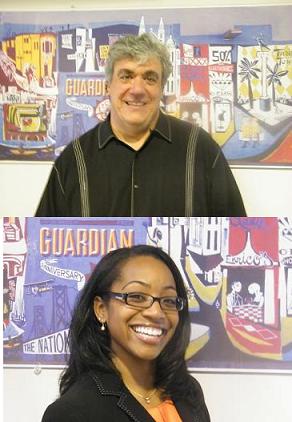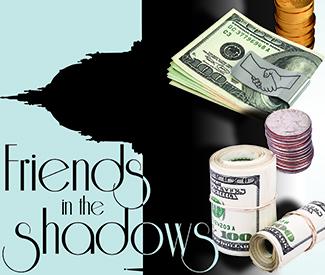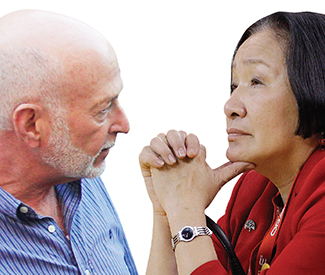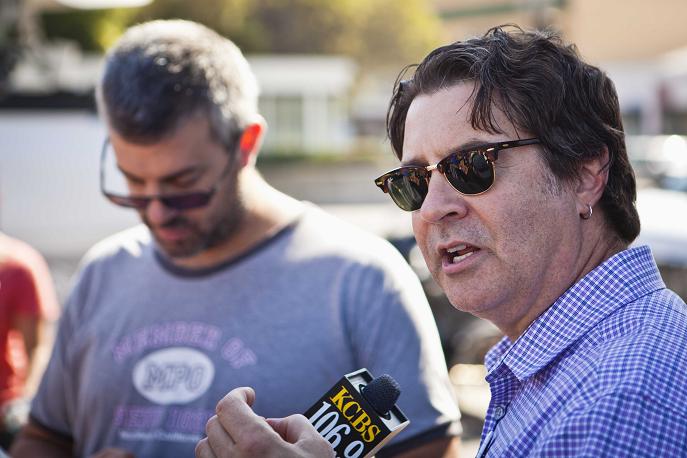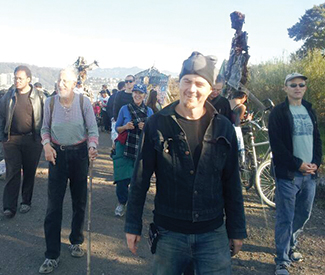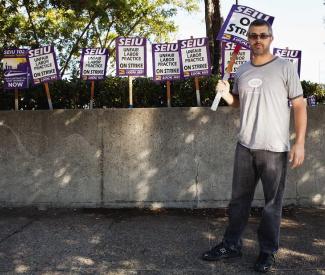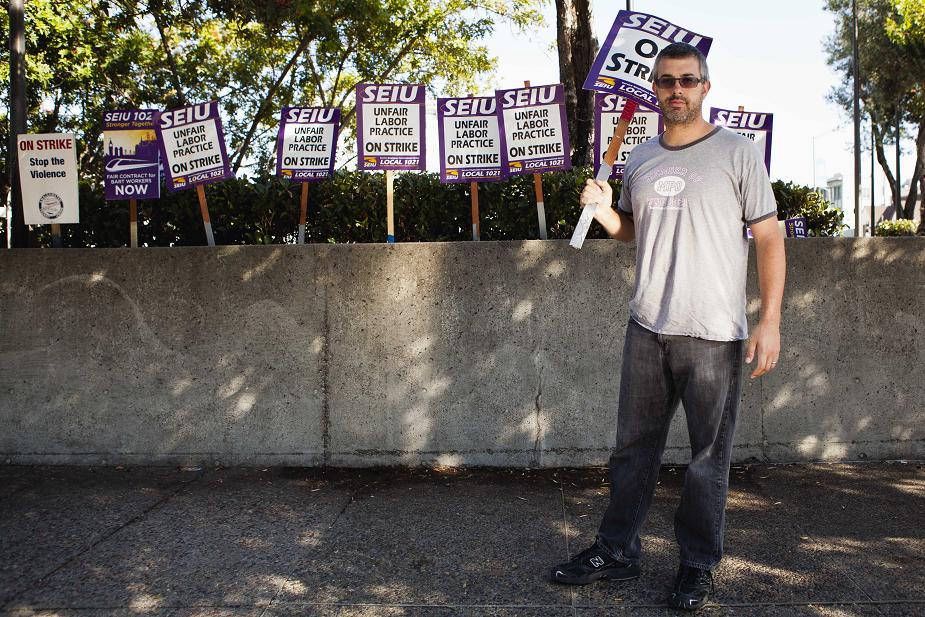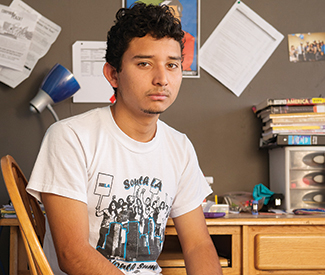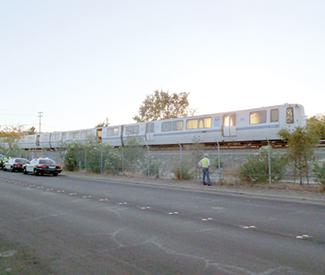WEDNESDAY 18
ROCK
Bottom of the Hill: 1233 17th St., San Francisco. Holograms, TV Ghost, G. Green, 9 p.m., $10-$12.
Brick & Mortar Music Hall: 1710 Mission, San Francisco. The Sweet Bones, Sam Code & The Gums, Edge City Ruins, Johns, Jack Graves, 9 p.m., $5-$7.
Cafe Du Nord: 2170 Market, San Francisco. MoonFox, Spider Heart, Lady Stardust, DJ Neil Martinson, 8:30 p.m., $8.
The Chapel: 777 Valencia St., San Francisco. Holidaze with The Blank Tapes, The Electric Magpie, The Spiral Electric, Assateague, 8 p.m., $12.
El Rio: 3158 Mission, San Francisco. Neon Anyway, The Threads S.F., Clementine’s Day, 8 p.m., $5.
Hemlock Tavern: 1131 Polk, San Francisco. The Kaizoku, Largesse, 8:30 p.m., $5.
Hotel Utah: 500 Fourth St., San Francisco. The Shams Eire, The Guverment, Another Tangent, Paul Magill, 8 p.m., $5.
The Knockout: 3223 Mission, San Francisco. The Riflemen, Nasty Christmas, Names, Richard Toomer, 9:30 p.m., $6.
Milk Bar: 1840 Haight, San Francisco. Owl Paws, Yassou Benedict, Fell Runner, Sunhaze, 9 p.m., $5.
DANCE
Beaux: 2344 Market, San Francisco. “BroMance: A Night Out for the Fellas,” 9 p.m., free.
The Cafe: 2369 Market, San Francisco. “Sticky Wednesdays,” w/ DJ Mark Andrus, 8 p.m., free.
Cat Club: 1190 Folsom, San Francisco. “Bondage A Go Go,” w/ DJs Damon, Tomas Diablo, & guests, 9:30 p.m., $5-$10.
Club X: 715 Harrison, San Francisco. “Electro Pop Rocks: The EPR Nightmare Before Christmas,” 18+ dance night, 9 p.m., $15 advance.
The EndUp: 401 Sixth St., San Francisco. “Tainted Techno Trance,” 10 p.m.
F8: 1192 Folsom St., San Francisco. “Housepitality,” w/ Guillaume & The Coutu Dumonts, Dave Aju, Tyrel Williams, Mike Bee, 9 p.m., $5-$10.
Harlot: 46 Minna, San Francisco. “Qoöl,” 5 p.m.
Infusion Lounge: 124 Ellis, San Francisco. “Indulgence,” 10 p.m.
Lookout: 3600 16th St., San Francisco. “What?,” w/ resident DJ Tisdale and guests, 7 p.m., free.
Madrone Art Bar: 500 Divisadero, San Francisco. “Rock the Spot,” 9 p.m., free.
Make-Out Room: 3225 22nd St., San Francisco. “Burn Down the Disco,” w/ DJs 2shy-shy & Melt w/U, Third Wednesday of every month, 9 p.m., free.
MatrixFillmore: 3138 Fillmore, San Francisco. “Reload,” w/ DJ Big Bad Bruce, 10 p.m., free.
Q Bar: 456 Castro, San Francisco. “Booty Call,” w/ Juanita More, Joshua J, guests, 9 p.m., $3.
Showdown: 10 Sixth St., San Francisco. “Nokturnal,” w/ DJs Coyle & Gonya, Third Wednesday of every month, 9 p.m., free.
HIP-HOP
Skylark Bar: 3089 16th St., San Francisco. “Mixtape Wednesday,” w/ resident DJs Strategy, Junot, Herb Digs, & guests, 9 p.m., $5.
Slate Bar: 2925 16th St., San Francisco. “Special Blend,” w/ resident DJs LazyBoy & Mr. Murdock, 9 p.m., free.
ACOUSTIC
Cafe Divine: 1600 Stockton, San Francisco. Craig Ventresco & Meredith Axelrod, 7 p.m., free.
Club Deluxe: 1511 Haight, San Francisco. Happy Hour Bluegrass, 6:30 p.m., free.
Fiddler’s Green: 1333 Columbus, San Francisco. Terry Savastano, Every other Wednesday, 9:30 p.m., free/donation.
Plough & Stars: 116 Clement, San Francisco. Annie Corbett, 9 p.m.
The Rite Spot Cafe: 2099 Folsom, San Francisco. Quinn DeVeaux, 8:30 p.m., free.
JAZZ
Amnesia: 853 Valencia, San Francisco. Gaucho, Eric Garland’s Jazz Session, The Amnesiacs, 7 p.m., free.
Burritt Room: 417 Stockton St., San Francisco. Terry Disley’s Rocking Jazz Trio, 6 p.m., free.
The Independent: 628 Divisadero, San Francisco. Charlie Hunter & Scott Amendola Duo, DJ Harry Duncan, 8 p.m., $20.
Jazz Bistro at Les Joulins: 44 Ellis, San Francisco. Charles Unger Experience, 7:30 p.m., free.
Le Colonial: 20 Cosmo, San Francisco. The Cosmo Alleycats featuring Ms. Emily Wade Adams, 7 p.m., free.
Revolution Cafe: 3248 22nd St., San Francisco. Michael Parsons Trio, Every other Wednesday, 8:30 p.m., free/donation.
Savanna Jazz Club: 2937 Mission, San Francisco. “Cat’s Corner,” 9 p.m., $10.
Sheba Piano Lounge: 1419 Fillmore, San Francisco. Fran Sholly, 8 p.m.
Top of the Mark: One Nob Hill, 999 California, San Francisco. Ricardo Scales, Wednesdays, 6:30-11:30 p.m., $5.
Zingari: 501 Post, San Francisco. Anya Malkiel, 7:30 p.m., free.
INTERNATIONAL
Bissap Baobab: 3372 19th St., San Francisco. Timba Dance Party, w/ DJ WaltDigz, 10 p.m., $5.
Cafe Cocomo: 650 Indiana, San Francisco. “Bachatalicious,” w/ DJs Good Sho & Rodney, 7 p.m., $5-$10.
Yoshi’s San Francisco: 1330 Fillmore, San Francisco. VOENA: Voices of the Season, 7 p.m., $14-$21.
BLUES
Biscuits and Blues: 401 Mason, San Francisco. HowellDevine, 8 & 10 p.m., $15.
The Royal Cuckoo: 3202 Mission, San Francisco. Big Bones & Chris Siebert, 7:30 p.m., free.
The Saloon: 1232 Grant, San Francisco. Leah Tysse, 9:30 p.m.
SOUL
Boom Boom Room: 1601 Fillmore, San Francisco. “Soul Train Revival,” w/ Ziek McCarter, Third Wednesday of every month, 9:30 p.m., $5.
Elbo Room: 647 Valencia, San Francisco. Myron & E, New Love Soul Revue, The Selecter DJ Kirk, 9 p.m., $8.
THURSDAY 19
ROCK
Boom Boom Room: 1601 Fillmore, San Francisco. Caught a Ghost, The Coffis Brothers & The Mountain Men, 9:30 p.m., $8-$10.
Bottom of the Hill: 1233 17th St., San Francisco. Good Riddance, Cobra Skulls, Western Addiction, 9 p.m., $13-$15.
Brick & Mortar Music Hall: 1710 Mission, San Francisco. Midnight Nasties, Working from Home, 9 p.m., $5-$7.
DNA Lounge: 375 11th St., San Francisco. Blood on the Dance Floor, Davey Suicide, The Relapse Symphony, Haley Rose, Lionfight, Kat Haus, 7 p.m., $17-$20.
S.F. Eagle: 398 12th St., San Francisco. Victory & Associates, Sit Kitty Sit, Winter Teeth, The Secret Secretaries, 9 p.m., $8.
Hemlock Tavern: 1131 Polk, San Francisco. Everyone Is Dirty, Frozen Folk, Light Thieves, 8:30 p.m., $6.
Hotel Utah: 500 Fourth St., San Francisco. Manzanita Falls, Ash Thursday, 9 p.m., $7.
Milk Bar: 1840 Haight, San Francisco. Should We Run, The Tropics, Gotaway Girl, 8:30 p.m., $8.
DANCE
Abbey Tavern: 4100 Geary, San Francisco. DJ Schrobi-Girl, 10 p.m., free.
Audio Discotech: 316 11th St., San Francisco. “Trap City,” w/ Kennedy Jones, UltraViolet, Harris Pilton, Napsty, Lé Swndle, more, 10 p.m., $10-$20.
Aunt Charlie’s Lounge: 133 Turk, San Francisco. “Tubesteak Connection,” w/ DJ Bus Station John, 9 p.m., $5-$7.
The Cafe: 2369 Market, San Francisco. “¡Pan Dulce!,” 9 p.m., $5.
Cat Club: 1190 Folsom, San Francisco. “Throwback Thursdays,” ‘80s night with DJs Damon, Steve Washington, Dangerous Dan, and guests, 9 p.m., $6 (free before 9:30 p.m.).
The Cellar: 685 Sutter, San Francisco. “XO,” w/ DJs Astro & Rose, 10 p.m., $5.
Club X: 715 Harrison, San Francisco. “The Crib,” 9:30 p.m., $10, 18+.
Elbo Room: 647 Valencia, San Francisco. “Afrolicious,” w/ DJs Pleasuremaker, Señor Oz, and live guests, 9:30 p.m., $5-$8.
F8: 1192 Folsom St., San Francisco. “Beat Church,” w/ Knowa Lusion, Tiger Fresh, Spekt1, Releece, Morzfeen, more, 10 p.m., $5-$10.
Harlot: 46 Minna, San Francisco. Marques Wyatt, 9 p.m.
Infusion Lounge: 124 Ellis, San Francisco. “I Love Thursdays,” 10 p.m., $10.
John Colins: 138 Minna, San Francisco. “SoLuna,” w/ resident DJ Miquel Penn, Third Thursday of every month, 9 p.m., free.
Laszlo: 2532 Mission, San Francisco. “Werk It,” w/ DJ Kool Karlo, Third Thursday of every month, 9 p.m., free.
Madrone Art Bar: 500 Divisadero, San Francisco. “Night Fever,” 9 p.m., $5 after 10 p.m.
Monarch: 101 6th St., San Francisco. Together, Typhoon Haiyan benefit with Worthy, Atish, Bells & Whistles, Elz, Papa Lu, Joey Alaniz, DJ Bluz, DJ Vinroc, Mr. E, The Whooligan, more., 7 p.m., donation.
Neck of the Woods: 406 Clement St., San Francisco. Blaus, on the downstairs stage, 10 p.m. continues through Dec. 26, free with RSVP.
Q Bar: 456 Castro, San Francisco. “Throwback Thursday,” w/ DJ Jay-R, 9 p.m., free.
Raven: 1151 Folsom St., San Francisco. “1999,” w/ VJ Mark Andrus, 8 p.m., free.
Rickshaw Stop: 155 Fell, San Francisco. “Popscene,” w/ Wild Cub, Aaron Axelsen, 10 p.m., $13-$15.
Ruby Skye: 420 Mason, San Francisco. “Awakening,” w/ Adrian Lux, 9 p.m., $20-$30 advance.
The Tunnel Top: 601 Bush, San Francisco. “Tunneltop,” DJs Avalon and Derek ease you into the weekend with a cool and relaxed selection of tunes spun on vinyl, 10 p.m., free.
Underground SF: 424 Haight, San Francisco. “Bubble,” 10 p.m., free.
Vessel: 85 Campton, San Francisco. “Base,” w/ DJs Alessandro, Rooz, and John Kaberna, 10 p.m., $5-$10.
HIP-HOP
1015 Folsom: 1015 Folsom St., San Francisco. Yasiin Bey aka Mos Def, Kev Choice, Jahi, DJ D-Sharp, Mr. E, DJ Leydis, 9 p.m., $25-$35 advance.
Eastside West: 3154 Fillmore, San Francisco. “Throwback Thursdays,” w/ DJ Madison, 9 p.m., free.
The EndUp: 401 Sixth St., San Francisco. “Cypher,” w/ resident DJ Big Von, 10 p.m., $5-$10.
Showdown: 10 Sixth St., San Francisco. “Tougher Than Ice,” w/ DJs Vin Sol, Ruby Red I, and Jeremy Castillo, Third Thursday of every month, 10 p.m.
Skylark Bar: 3089 16th St., San Francisco. “Peaches,” w/ lady DJs DeeAndroid, Lady Fingaz, That Girl, Umami, Inkfat, and Andre, 10 p.m., free.
ACOUSTIC
Amnesia: 853 Valencia, San Francisco. The Amigos Band, Ben Flocks, 7:30 p.m., $7-$10.
Atlas Cafe: 3049 20th St., San Francisco. Bluegrass & Old-Time Music Jam Session, 8 p.m., free.
Bazaar Cafe: 5927 California, San Francisco. Acoustic Open Mic, 7 p.m.
Cigar Bar & Grill: 850 Montgomery, San Francisco. The Neckbeard Boys, 8 p.m.
The Independent: 628 Divisadero, San Francisco. Nat Keefe Concert Carnival, w/ Tim Carbone, Tim Flannery, The T Sisters, Melody Walker & Jacob Groopman, Matt Sharkey, The Coeds, members of Hot Buttered Rum, DJ Shooey, more, 8 p.m., $20-$35.
The Lost Church: 65 Capp St., San Francisco. The Scrap on Capp: Songwriter Grudge Match, w/ Maurice Tani vs. Paul Griffiths, 8 p.m., $10.
Make-Out Room: 3225 22nd St., San Francisco. Parker Gibbs’ Annual Holiday Craptacular, S.F. Food Bank can drive featuring Marc & The Casuals, Mark Eitzel, Kelley Stoltz, Paula Frazer, Joel Robinow, Justin Frahm, more, 7 p.m., $15 plus non-perishable food item.
Plough & Stars: 116 Clement, San Francisco. Emperor Norton Céilí Band, 9 p.m.
JAZZ
Blush! Wine Bar: 476 Castro, San Francisco. Doug Martin’s Avatar Ensemble, 7:30 p.m., free.
Bottle Cap: 1707 Powell, San Francisco. The North Beach Sound with Ned Boynton, Jordan Samuels, and Tom Vickers, 7 p.m., free.
Cafe Claude: 7 Claude, San Francisco. Dick Fregulia’s Good Vibes Trio, 7:30 p.m., free.
Jazz Bistro at Les Joulins: 44 Ellis, San Francisco. Eugene Pliner Quartet with Tod Dickow, First and Third Thursday of every month, 7:30 p.m., free.
Le Colonial: 20 Cosmo, San Francisco. Steve Lucky & The Rhumba Bums, 7:30 p.m.
The Lucky Horseshoe: 453 Cortland, San Francisco. Ralph Carney’s Serious Jass Project, 9 p.m.
Pier 23 Cafe: Pier 23, San Francisco. Grant Levin Group, 7 p.m., free.
The Royal Cuckoo: 3202 Mission, San Francisco. Charlie Siebert & Chris Siebert, 7:30 p.m., free.
Savanna Jazz Club: 2937 Mission, San Francisco. Savanna Jazz Jam with Eddy Ramirez, 7:30 p.m., $5.
Top of the Mark: One Nob Hill, 999 California, San Francisco. Stompy Jones, 7:30 p.m., $10.
Zingari: 501 Post, San Francisco. Barbara Ochoa, 7:30 p.m., free.
INTERNATIONAL
Bissap Baobab: 3372 19th St., San Francisco. “Pa’Lante!,” w/ Juan G, El Kool Kyle, Mr. Lucky, 10 p.m., $5.
Cafe Cocomo: 650 Indiana, San Francisco. Bembe, DJ Good Sho, 8 p.m., $12.
Jewish Community Center of San Francisco: 3200 California, San Francisco. “Celebrating Cuba,” w/ Vission Latina, 7 p.m., free with RSVP (required), arts@jccsf.org.
Pachamama Restaurant: 1630 Powell, San Francisco. “Jueves Flamencos,” 8 p.m., free.
Sheba Piano Lounge: 1419 Fillmore, San Francisco. Gary Flores & Descarga Caliente, 8 p.m.
Verdi Club: 2424 Mariposa, San Francisco. The Verdi Club Milonga, w/ Christy Coté, DJ Emilio Flores, guests, 9 p.m., $10-$15.
REGGAE
Pissed Off Pete’s: 4528 Mission St., San Francisco. Reggae Thursdays, w/ resident DJ Jah Yzer, 9 p.m., free.
Slim’s: 333 11th St., San Francisco. Bayonics, Native Elements, Da Mainland, DJ Mr. Lucky, 9 p.m., $14.
BLUES
50 Mason Social House: 50 Mason, San Francisco. Bill Phillippe, 5:30 p.m., free.
Biscuits and Blues: 401 Mason, San Francisco. Jules Leyhe, 7:30 & 9:30 p.m., $15.
The Saloon: 1232 Grant, San Francisco. Chris Ford, Third Thursday of every month, 4 p.m.; Craig Horton, 9:30 p.m.
COUNTRY
The Parlor: 2801 Leavenworth, San Francisco. “Twang Honky Tonk & Country Jamboree,” w/ DJ Little Red Rodeo, 7 p.m., free.
EXPERIMENTAL
The Luggage Store: 1007 Market, San Francisco. Dave DeFilippo, Joshua Marshall, 8 p.m., $6-$10.
FUNK
Cafe Du Nord: 2170 Market, San Francisco. Black Christmas with the Afrofunk Experience & Broun Fellinis, 8:30 p.m., $8.
SOUL
Make-Out Room: 3225 22nd St., San Francisco. “Sugar Snap,” w/ DJ JZA, Third Thursday of every month, 6 p.m., free; “Soul: It’s the Real Thing,” 11 p.m., free.
Yoshi’s San Francisco: 1330 Fillmore, San Francisco. Sweet Soul Christmas with Greg Adams & East Bay Soul, 8 p.m., $25.
FRIDAY 20
ROCK
Bottom of the Hill: 1233 17th St., San Francisco. Eric McFadden & Friends, The Pleasure Kills, The Campbell Apartment, 9:30 p.m., $10-$12.
Brick & Mortar Music Hall: 1710 Mission, San Francisco. Freestone Peaches, Pat Nevins, 9 p.m., $7-$10.
Cafe Du Nord: 2170 Market, San Francisco. Icewater, Eleanor Friedberger, Michael & The Strange Land, Proceeds benefit a fund established in Grant Martin’s memory to provide music assistance for underprivileged students., 9:30 p.m., $10-$15.
El Rio: 3158 Mission, San Francisco. Friday Live: Steel Hotcakes, DJ Emotions, 10 p.m., free.
Elbo Room: 647 Valencia, San Francisco. The El Vez & Rosie Flores Mexmas Show, w/ Toshio Hirano, DJ Sid Presley, 9 p.m., $15-$18.
Hotel Utah: 500 Fourth St., San Francisco. The Night Falls, The Desert Line, The Beggars Who Give, Bears for Sharks, 9 p.m., $8.
The Independent: 628 Divisadero, San Francisco. The Growlers, The Abigails, Mystic Braves, 9 p.m., $20.
Slim’s: 333 11th St., San Francisco. Exodus, Nails, Hellfire, 8 p.m., $25.
DANCE
1015 Folsom: 1015 Folsom St., San Francisco. “Re:Creation,” w/ Purity Ring (DJ set), Giraffage, Sweater Beats, Insightful, B. Lewis, Pony Bwoy, DJ Dials, more, 10 p.m., $15-$20 advance.
Audio Discotech: 316 11th St., San Francisco. Pezzner, Fred Everything, 9:30 p.m., $10 advance.
BeatBox: 314 11th St., San Francisco. “Bears in the Dark,” w/ DJ John LePage, 10 p.m., $5-$10.
Cafe Flore: 2298 Market, San Francisco. “Kinky Beats,” w/ DJ Sergio, 10 p.m., free.
The Cafe: 2369 Market, San Francisco. “Boy Bar,” w/ DJ Matt Consola, 9 p.m., $5.
Cat Club: 1190 Folsom, San Francisco. “Violator: A Depeche Mode Tribute Night,” w/ DJs Tomas Diablo, Daniel Skellington, and Sage, 9:30 p.m., $7 ($4 before 10 p.m.).
The Cellar: 685 Sutter, San Francisco. “F.T.S.: For the Story,” 10 p.m.
DNA Lounge: 375 11th St., San Francisco. “The End,” w/ Hieroglyphics, Wick-it the Instigator, Ill-Esha, K Theory, Sugarpill, Singularity, Sam F, Mutrix, Stylust Beats, Clark Kent, LabRat, J. Lately, many more, 8 p.m., $25-$35.
The EndUp: 401 Sixth St., San Francisco. “Fever,” 10 p.m., free before midnight.
The Grand Nightclub: 520 4th St., San Francisco. “We Rock Fridays,” 9:30 p.m.
Infusion Lounge: 124 Ellis, San Francisco. “Escape Fridays,” 10 p.m., $20.
Lookout: 3600 16th St., San Francisco. “HYSL,” 9 p.m., $3.
Madrone Art Bar: 500 Divisadero, San Francisco. “That ‘80s Show,” w/ DJs Dave Paul & Jeff Harris, Third Friday of every month, 9 p.m., $5.
Manor West: 750 Harrison, San Francisco. “Fortune Fridays,” w/ DJ Solarz & Marcus Lee, 10 p.m.
MatrixFillmore: 3138 Fillmore, San Francisco. “F-Style Fridays,” w/ DJ Jared-F, 9 p.m.
Monarch: 101 6th St., San Francisco. “Disco Knights,” w/ Wolf + Lamb, DJ M3, Anthony Mansfield, 10 p.m., $15-$20 advance.
OMG: 43 6th St., San Francisco. “Release,” 9 p.m., free before 11 p.m.
Public Works: 161 Erie, San Francisco. “Odyssey,” w/ Matrixxman, Vin Sol, Robin Simmons (in the OddJob loft), 9:30 p.m., $10.
Q Bar: 456 Castro, San Francisco. “Pump: Worq It Out Fridays,” w/ resident DJ Christopher B, 9 p.m., $3.
Ruby Skye: 420 Mason, San Francisco. Fleming & Lawrence, aka John 00 Fleming & Christopher Lawrence, 9 p.m., $20-$25 advance.
Slate Bar: 2925 16th St., San Francisco. “A Darling Nikki/Hella Gay Soirée,” w/ DJs Durt, Finn, Black, and G-Star, 9 p.m., $5.
Underground SF: 424 Haight, San Francisco. “Bionic,” 10 p.m., $5.
Vessel: 85 Campton, San Francisco. Autoérotique, Justin Milla, 10 p.m., $10-$30.
Wish: 1539 Folsom, San Francisco. “Bridge the Gap,” w/ resident DJ Don Kainoa, Fridays, 6-10 p.m., free; “Depth,” w/ resident DJs Sharon Buck & Greg Yuen, Third Friday of every month, 10 p.m., free.
HIP-HOP
EZ5: 682 Commercial, San Francisco. “Decompression,” Fridays, 5-9 p.m.
John Colins: 138 Minna, San Francisco. “Juicy,” w/ DJ Ry Toast, Third Friday of every month, 10 p.m., $5 (free before 11 p.m.).
Mighty: 119 Utah, San Francisco. Mighty 10-Year Anniversary, w/ Triple Threat DJs Shortkut, Apollo, and Vinroc, 9 p.m., $5 (free before midnight with RSVP).
Public Works: 161 Erie, San Francisco. DJ Z-Trip, DJ Goldenchyld, J-Boogie, Ren the Vinyl Archaeologist, 9 p.m., $18.
Rickshaw Stop: 155 Fell, San Francisco. American Tripps Hip-Hop & Ping Pong: Ho-Ho-Ho Edition, w/ DJ Beauregard, 8 p.m., $5-$7.
Showdown: 10 Sixth St., San Francisco. “Fresh to Def Fridays: A Tribute to Yo! MTV Raps,” w/ resident DJs Boom Bostic, Inkfat, and Hay Hay, Third Friday of every month, 10 p.m.
ACOUSTIC
Bazaar Cafe: 5927 California, San Francisco. John Elliott, 7 p.m.
The Chapel: 777 Valencia St., San Francisco. KALX Solstice in Stereo, w/ Foxtails Brigade, The Seshen, Farallons, 9 p.m., $12-$14.
Mercury Cafe: 201 Octavia, San Francisco. Toshio Hirano, Third Friday of every month, 7:30 p.m., free, all ages.
Old First Presbyterian Church: 1751 Sacramento, San Francisco. Golden Bough: A Celtic Yuletide Celebration, 8 p.m., $14-$17.
Pa’ina: 1865 Post St., San Francisco. Ukulenny, 7 p.m.
Plough & Stars: 116 Clement, San Francisco. “Bluegrass Bonanza,” w/ The Dust Bowl Cavaliers, Nobody from Nashville, 9 p.m., $6-$10.
The Sports Basement: 610 Old Mason, San Francisco. “Breakfast with Enzo,” w/ Enzo Garcia, 10 a.m., $5.
JAZZ
Atlas Cafe: 3049 20th St., San Francisco. ESP Quartet, 7:30 p.m., free.
Beach Chalet Brewery & Restaurant: 1000 Great Highway, San Francisco. Johnny Smith, 8 p.m., free.
Bird & Beckett: 653 Chenery, San Francisco. The Third Quartet, Third Friday of every month, 5:30 p.m., free.
Cafe Claude: 7 Claude, San Francisco. Marcus Shelby Trio, 7:30 p.m., free.
Jazz Bistro at Les Joulins: 44 Ellis, San Francisco. Charles Unger Experience, 7:30 p.m., free.
The Palace Hotel: 2 New Montgomery, San Francisco. The Klipptones, 8 p.m., free.
Pier 23 Cafe: Pier 23, San Francisco. Hard Bop Collective, 8 p.m., free.
Revolution Cafe: 3248 22nd St., San Francisco. Emily Anne’s Delights, Third Friday of every month, 8:45 p.m., free/donation.
Savanna Jazz Club: 2937 Mission, San Francisco. Benn Bacot, 7:30 p.m., $8.
Top of the Mark: One Nob Hill, 999 California, San Francisco. Black Market Jazz Orchestra, 9 p.m., $10.
Verdi Club: 2424 Mariposa, San Francisco. Sixth Annual Stompy Jones Sleigh Ride, 8 p.m., $15.
Yoshi’s San Francisco: 1330 Fillmore, San Francisco. The Count Basie Orchestra, 8 & 10 p.m., $29-$35.
Zingari: 501 Post, San Francisco. Joyce Grant, 8 p.m., free.
INTERNATIONAL
Asiento: 2730 21st St., San Francisco. “Kulcha Latino,” w/ resident selectors Stepwise, Ras Rican, and El Kool Kyle, Third Friday of every month, 9 p.m., free.
Bissap Baobab: 3372 19th St., San Francisco. Qumbia Qrew, Third Friday of every month, 8 p.m.; “Paris-Dakar African Mix Coupe Decale,” 10 p.m., $5.
Cafe Cocomo: 650 Indiana, San Francisco. Taste Fridays, featuring local cuisine tastings, salsa bands, dance lessons, and more, 7:30 p.m., $15 (free entry to patio).
Cigar Bar & Grill: 850 Montgomery, San Francisco. Conjunto Picante, 10 p.m.
Pachamama Restaurant: 1630 Powell, San Francisco. Cuban Night with Fito Reinoso, 7:30 & 9:15 p.m., $15-$18.
Red Poppy Art House: 2698 Folsom, San Francisco. A Night of Latin American Music, 7:30 p.m., $10-$15.
REGGAE
Gestalt Haus: 3159 16th St., San Francisco. “Music Like Dirt,” 7:30 p.m., free.
BLUES
Biscuits and Blues: 401 Mason, San Francisco. Rod Piazza & The Mighty Flyers, 7:30 & 10 p.m., $24.
Lou’s Fish Shack: 300 Jefferson St., San Francisco. Eldon Brown, 6:30 p.m.
The Saloon: 1232 Grant, San Francisco. Highwater Blues, 4 p.m.; Chris Cobb, 9:30 p.m.
FUNK
Amnesia: 853 Valencia, San Francisco. “Hella Tight,” w/ resident DJs Vinnie Esparza, Jonny Deeper, & Asti Spumanti, Third Friday of every month, 10 p.m., $5.
Boom Boom Room: 1601 Fillmore, San Francisco. Bad Jellyfish, 9:30 p.m., $20 advance.
Make-Out Room: 3225 22nd St., San Francisco. “Loose Joints,” w/ DJs Centipede, Damon Bell, and Tom Thump, 10 p.m., $5-$10.
SOUL
Edinburgh Castle: 950 Geary, San Francisco. “Soul Crush,” w/ DJ Serious Leisure, 10 p.m., free.
Feinstein’s at the Nikko: 222 Mason St., San Francisco. “Love Hangover: LaChanze Sings Diana Ross,” Fri., Dec. 20, 8 p.m.; Sat., Dec. 21, 7 p.m., $30-$50.
The Knockout: 3223 Mission, San Francisco. “Oldies Night,” W/ DJs Primo, Daniel, Lost Cat, and friends, Third Friday of every month, 10 p.m., $5.
The Royal Cuckoo: 3202 Mission, San Francisco. Freddie Hughes & Chris Burns, 7:30 p.m., free.
SATURDAY 21
ROCK
Bottom of the Hill: 1233 17th St., San Francisco. Happy Body Slow Brain, Facing New York, Gavin Castleton, Via Coma, 9 p.m., $10-$12.
Cafe Du Nord: 2170 Market, San Francisco. Beware of Darkness, Down & Outlaws, 9:30 p.m., $10.
El Rio: 3158 Mission, San Francisco. The Atomic Machines, The Shams Eire, Fenton Coolfoot & The Right Time, 9 p.m., $8.
Hemlock Tavern: 1131 Polk, San Francisco. Hungry Skinny, Saturn Cats, Brasil, 9:30 p.m., $6.
The Independent: 628 Divisadero, San Francisco. The Growlers, The Abigails, Cat Signs, 9 p.m., $20.
Make-Out Room: 3225 22nd St., San Francisco. Windham Flat, That’s Not Her, 7:30 p.m., $8.
The Riptide: 3639 Taraval, San Francisco. The Honey Wilders, 9:30 p.m., free.
Slim’s: 333 11th St., San Francisco. The Vandals’ 18th Annual Christmas Formal with Emily’s Army, The Blast, 9 p.m., $18.
Thee Parkside: 1600 17th St., San Francisco. Youth Brigade, Civil War Rust, Rats in the Wall, Bum City Saints, 9 p.m., $12.
DANCE
Amnesia: 853 Valencia, San Francisco. “Pance Darty,” w/ Jjaaxxnn & Duke, Third Saturday of every month, 9 p.m., $7.
Audio Discotech: 316 11th St., San Francisco. Felix Da Housecat, Andrew Phelan, Mario Dubbz, 9:30 p.m., $10 advance.
BeatBox: 314 11th St., San Francisco. “Evolution,” w/ DJ Alexander, 10 p.m.
Cafe Flore: 2298 Market, San Francisco. “Bistrotheque,” w/ DJ Ken Vulsion, 8 p.m., free.
Cat Club: 1190 Folsom, San Francisco. “New Wave City: Numan League – A Double-Synth Tribute to Gary Numan and the Human League,” w/ DJs Skip, Shindog, Low-Life, Kenny, and Moonshine, 9 p.m., $7-$12.
The Chapel: 777 Valencia St., San Francisco. The Range, 9 p.m., $12.
DNA Lounge: 375 11th St., San Francisco. “Bootie S.F.,” w/ Entyme, MyKill, Meikee Magnetic, Mixtress ShiZaam, more., 9 p.m., $10-$15.
The EndUp: 401 Sixth St., San Francisco. “The Show,” w/ Syd Gris, DJ Denise, Dragn’fly, Influence, Ryan Cavalier, Bill Samuels, Ben Seagren, Lise Rose, Beau Kelly, 10 p.m.
F8: 1192 Folsom St., San Francisco. “Team Supreme S.F.,” w/ B. Lewis, Colta, Mike Gao, Jnthn Stein, Kenny Segal, Ruff Draft, more, 9 p.m., $5-$15.
Il Pirata: 2007 16th St., San Francisco. “Requiem,” w/ DJs Xiola, Owen, and Dire DeLorean, 10 p.m.
Infusion Lounge: 124 Ellis, San Francisco. “Social Addiction,” Third Saturday of every month, 10 p.m., $20.
Lookout: 3600 16th St., San Francisco. “Bounce!,” 9 p.m., $3.
Madrone Art Bar: 500 Divisadero, San Francisco. “Fringe,” w/ DJs Blondie K & subOctave, Third Saturday of every month, 9 p.m., $5 (free before 10 p.m.).
Manor West: 750 Harrison, San Francisco. “Chemistry Saturdays,” w/ DJ Scooter, 10 p.m.
Mezzanine: 444 Jessie, San Francisco. “Fools in the Night: Winter Wonderland,” w/ Viceroy, Mystery Skulls, FM Attack, Amble, 9 p.m., $15.
Mighty: 119 Utah, San Francisco. “Salted,” w/ Grant Nelson, Miguel Migs, Julius Papp, 10 p.m., $10 before 11 p.m.
Milk Bar: 1840 Haight, San Francisco. “The Queen Is Dead: A Tribute to the Music of Morrissey & The Smiths,” w/ DJ Mario Muse & guests, Third Saturday of every month, 9 p.m.
Monarch: 101 6th St., San Francisco. “Night Moves,” w/ Kevin Knapp, Jimmy B, Brothers in Arms (J-Boogie & Deejay Theory), Papa Lu, 9 p.m., $10-$20.
Powerhouse: 1347 Folsom, San Francisco. “Beatpig,” Third Saturday of every month, 9 p.m.
Public Works: 161 Erie, San Francisco. “Deep Blue,” w/ Tini, DJ Rooz, more (in the main room), 9:30 p.m., $10-$20; “All Night Long,” w/ DJ Garth (in the OddJob Loft), 10 p.m., $7 advance.
Rickshaw Stop: 155 Fell, San Francisco. “Gameboi S.F.: The Annual Xmas Party,” w/ VJ LaRock, 9:30 p.m., $8-$15.
Ruby Skye: 420 Mason, San Francisco. “World Town: 6-Year Anniversary,” w/ Henrix, Trevor Simpson, 9 p.m., $20 advance.
Slate Bar: 2925 16th St., San Francisco. “Smiths Night S.F.,” w/ The Certain People Crew, Third Saturday of every month, 10 p.m., $5.
Slide: 430 Mason, San Francisco. “Luminous,” w/ DJ Zhaldee, Third Saturday of every month, 9 p.m.
The Stud: 399 Ninth St., San Francisco. Squrrrl Gives Back, Larkin Street Youth Services benefit with DJs Trevor Sigler, Joe Pickett, and Ben Holder., 9 p.m., $5.
Vessel: 85 Campton, San Francisco. EDX, 10 p.m., $10 advance.
HIP-HOP
111 Minna Gallery: 111 Minna St., San Francisco. “Shine,” Third Saturday of every month, 10 p.m.
Brick & Mortar Music Hall: 1710 Mission, San Francisco. Rappin’ 4-Tay, RBL Posse, Cellski, Equipto, 10 p.m., $8-$10.
John Colins: 138 Minna, San Francisco. “The Bump,” w/ The Whooligan, Third Saturday of every month, 10 p.m., free.
The Knockout: 3223 Mission, San Francisco. “The Booty Bassment,” w/ DJs Dimitri Dickinson & Ryan Poulsen, Third Saturday of every month, 10 p.m., $5.
Showdown: 10 Sixth St., San Francisco. “Purple,” w/ resident DJs ChaunceyCC & Party Pablo, Third Saturday of every month, 10 p.m.
Skylark Bar: 3089 16th St., San Francisco. “Night Swim,” w/ resident DJ Mackswell, Third Saturday of every month, 10 p.m.
ACOUSTIC
Atlas Cafe: 3049 20th St., San Francisco. Craig Ventresco & Meredith Axelrod, Saturdays, 4-6 p.m., free.
Bazaar Cafe: 5927 California, San Francisco. Sweet Hayah, Samuel Roland, Olivia Clayton, 7 p.m.
Hotel Utah: 500 Fourth St., San Francisco. Bonnie Sun, Jean Marc Enriquez, Gyasi Ross, 9 p.m., $10.
The Lost Church: 65 Capp St., San Francisco. Eight Belles, Jameson Swanagon, 8 p.m., $10.
The Lucky Horseshoe: 453 Cortland, San Francisco. Xmas with the Bogues, 9 p.m.
Plough & Stars: 116 Clement, San Francisco. Daniel Seidel, 9 p.m.
The Rite Spot Cafe: 2099 Folsom, San Francisco. Toshio Hirano, 9 p.m., free.
St. Cyprian’s Episcopal Church: 2097 Turk, San Francisco. Celtic Winter Solstice Concert with Four Shillings Short & Brocelïande, 7:30 p.m., $10-$12.
JAZZ
Cafe Claude: 7 Claude, San Francisco. Monroe Trio, 7:30 p.m., free.
Jazz Bistro at Les Joulins: 44 Ellis, San Francisco. Bill “Doc” Webster & Jazz Nostalgia, 7:30 p.m., free.
Pier 23 Cafe: Pier 23, San Francisco. Legends & Friends, 8 p.m., free.
The Royal Cuckoo: 3202 Mission, San Francisco. Jules Broussard, Danny Armstrong, and Chris Siebert, 7:30 p.m., free.
Savanna Jazz Club: 2937 Mission, San Francisco. Savanna Jazz Trio, 7:30 p.m., $8.
Sheba Piano Lounge: 1419 Fillmore, San Francisco. The Robert Stewart Experience, 9 p.m.
Yoshi’s San Francisco: 1330 Fillmore, San Francisco. The Count Basie Orchestra, 8 & 10 p.m., $29-$35.
INTERNATIONAL
1015 Folsom: 1015 Folsom St., San Francisco. “Pura,” 9 p.m., $20.
Bissap Baobab: 3372 19th St., San Francisco. “Paris-Dakar African Mix Coupe Decale,” 10 p.m., $5.
Cafe Cocomo: 650 Indiana, San Francisco. La Fuerza Gigante, El DJ X, 8 p.m., $15.
Cigar Bar & Grill: 850 Montgomery, San Francisco. Orquesta La Clave Del Blanco, 10 p.m.
Make-Out Room: 3225 22nd St., San Francisco. “El SuperRitmo,” w/ DJs Roger Mas & El Kool Kyle, 10 p.m., $5 before 11 p.m.
Old First Presbyterian Church: 1751 Sacramento, San Francisco. Kitka: Wintersongs, 8 p.m., $15-$25.
Pachamama Restaurant: 1630 Powell, San Francisco. Eddy Navia & Pachamama Band, 8 p.m., free.
Red Poppy Art House: 2698 Folsom, San Francisco. Bolo, 7:30 p.m., $15-$20.
Revolution Cafe: 3248 22nd St., San Francisco. Go Van Gogh, Third Saturday of every month, 9 p.m., free/donation.
Space 550: 550 Barneveld, San Francisco. “Club Fuego,” 9:30 p.m.
Yoshi’s San Francisco: 1330 Fillmore, San Francisco. Nene Malo, in Yoshi’s lounge, 10:30 p.m., $25-$30.
BLUES
Biscuits and Blues: 401 Mason, San Francisco. Rod Piazza & The Mighty Flyers, 7:30 & 10 p.m., $24.
Lou’s Fish Shack: 300 Jefferson St., San Francisco. Willie G, 6:30 p.m.
The Saloon: 1232 Grant, San Francisco. Tony Perez & Second Hand Smoke, Third Saturday of every month, 4 p.m.; Stan Erhart, 9:30 p.m.
EXPERIMENTAL
Center for New Music: 55 Taylor St., San Francisco. RTD3, 8 p.m., $7-$10.
FUNK
Boom Boom Room: 1601 Fillmore, San Francisco. Funk Revival Orchestra, Swoop Unit, DJ K-Os, 9:30 p.m., $10-$15.
Pa’ina: 1865 Post St., San Francisco. Typhoon Fundraiser with Chocolate Rice, 7 p.m.
SOUL
Elbo Room: 647 Valencia, San Francisco. “Saturday Night Soul Party,” w/ DJs Lucky, Phengren Oswald, and Paul Paul, Third Saturday of every month, 10 p.m., $10 ($5 in formal attire).
Feinstein’s at the Nikko: 222 Mason St., San Francisco. “Love Hangover: LaChanze Sings Diana Ross,” Fri., Dec. 20, 8 p.m.; Sat., Dec. 21, 7 p.m., $30-$50.
SUNDAY 22
ROCK
DNA Lounge: 375 11th St., San Francisco. The Jingle Bell Rock & Metal Fest 2013, w/ First Contact, This Plague Between Us, Orbiting Pluto, The Wet Bandits, Point of Interest, Ocelot, Global Affront, Bellyfull, Hairstrike, Sketch Republic, Posers, The A6’s, Parkside, Only the Pinkys, Pillars of Hercules, Mythra, Buried, 5:30 p.m., $10-$15.
Great American Music Hall: 859 O’Farrell, San Francisco. The Ugly Sweater Social: Day 1, w/ Finish Ticket, French Cassettes, 9 p.m., $1-$20.
Hemlock Tavern: 1131 Polk, San Francisco. Wreck & Reference, Creepers, So Stressed, 8:30 p.m., $6.
Make-Out Room: 3225 22nd St., San Francisco. Chrome Eagle, Crystal Goblet, 7:30 p.m., $8.
Slim’s: 333 11th St., San Francisco. Strung Out (playing An American Paradox), Voodoo Glow Skulls, Dearly Divided, 8 p.m., $18-$20.
Sub-Mission Art Space (Balazo 18 Gallery): 2183 Mission, San Francisco. Jokes for Feelings, Sarchasm, Push, MFB, Skank Bank, 7:30 p.m., $7.
DANCE
BeatBox: 314 11th St., San Francisco. “Tea-Rex,” w/ DJ Corey Craig, 4-8 p.m., $10.
Beauty Bar: 2299 Mission, San Francisco. “The Horror Hop: A December to Dismember,” w/ DJs Creepy B, Adrienne Scissorhands, and Roxy Rolle, 10 p.m., free.
The Cellar: 685 Sutter, San Francisco. “Replay Sundays,” 9 p.m., free.
Club X: 715 Harrison, San Francisco. “Electro Pop Rocks: EPR’s Electric Christmas,” 18+ dance night, 9 p.m.
The Edge: 4149 18th St., San Francisco. “’80s at 8,” w/ DJ MC2, 8 p.m.
Elbo Room: 647 Valencia, San Francisco. “Dub Mission,” w/ Kush Arora, Jimmy Love, DJ Sep, 9 p.m., $6 (free before 9:30 p.m.).
The EndUp: 401 Sixth St., San Francisco. “T.Dance,” 6 a.m.-6 p.m.; “Local Love,” Fourth Sunday of every month, 8 p.m.; “Sunday Sessions,” 8 p.m.
F8: 1192 Folsom St., San Francisco. “Stamina,” w/ Flaco, Submorphics, Retox, Canadub, 10 p.m., free.
The Knockout: 3223 Mission, San Francisco. “Sweater Funk,” 10 p.m., free.
Lookout: 3600 16th St., San Francisco. “Jock,” Sundays, 3-8 p.m., $2.
MatrixFillmore: 3138 Fillmore, San Francisco. “Bounce,” w/ DJ Just, 10 p.m.
Monarch: 101 6th St., San Francisco. “Reload,” w/ Pedro Arbulu, 9 p.m., $5.
Otis: 25 Maiden, San Francisco. “What’s the Werd?,” w/ resident DJs Nick Williams, Kevin Knapp, Maxwell Dub, and guests, 9 p.m., $5 (free before 11 p.m.).
The Parlor: 2801 Leavenworth, San Francisco. DJ Marc deVasconcelos, 10 p.m., free.
Q Bar: 456 Castro, San Francisco. “Gigante,” 8 p.m., free.
The Stud: 399 Ninth St., San Francisco. “Cognitive Dissonance,” Fourth Sunday of every month, 6 p.m.
HIP-HOP
Boom Boom Room: 1601 Fillmore, San Francisco. “Return of the Cypher,” 9:30 p.m., free.
ACOUSTIC
Amnesia: 853 Valencia, San Francisco. Merry Flipping Christmas Variety Show, w/ Heidi Alexander, Noelle Cahill, Jen Snyder, Sonny Smith, Justin Frahm, Rob Spector, Paula Frazer, Bart Davenport, Paul Costuros, Matt Shapiro, more, 9 p.m.
Bazaar Cafe: 5927 California, San Francisco. Manjali Light, 6 p.m.
Lou’s Fish Shack: 300 Jefferson St., San Francisco. Sam Johnson, 4 p.m.
The Lucky Horseshoe: 453 Cortland, San Francisco. Bernal Mountain Bluegrass Jam, 4 p.m., free; JimBo Trout & The Fishpeople, 8 p.m.
Madrone Art Bar: 500 Divisadero, San Francisco. “Spike’s Mic Night,” Sundays, 4-8 p.m., free.
Plough & Stars: 116 Clement, San Francisco. The Pat O’Donnell Band, 9 p.m.
St. Luke’s Episcopal Church: 1755 Clay, San Francisco. “Sunday Night Mic,” w/ Roem Baur, 5 p.m., free.
JAZZ
Bird & Beckett: 653 Chenery, San Francisco. Buena Vista Jazz Band, 4:30 p.m., free.
Biscuits and Blues: 401 Mason, San Francisco. Kim Nalley’s Gospel Christmas, 7:30 & 9:30 p.m., $22.
Jazz Bistro at Les Joulins: 44 Ellis, San Francisco. Bill “Doc” Webster & Jazz Nostalgia, 7:30 p.m., free.
Madrone Art Bar: 500 Divisadero, San Francisco. “Sunday Sessions,” 10 p.m., free.
Revolution Cafe: 3248 22nd St., San Francisco. Jazz Revolution, 4 p.m., free/donation.
The Royal Cuckoo: 3202 Mission, San Francisco. Lavay Smith & Chris Siebert, 7:30 p.m., free.
Zingari: 501 Post, San Francisco. Amanda Addleman, 7:30 p.m., free.
INTERNATIONAL
Atmosphere: 447 Broadway, San Francisco. “Hot Bachata Nights,” w/ DJ El Guapo, 5:30 p.m., $10 ($18-$25 with dance lessons).
Balancoire: 2565 Mission St., San Francisco. “Tardeadas Tropicales,” 3 p.m.
Bissap Baobab: 3372 19th St., San Francisco. “Brazil & Beyond,” 6:30 p.m., free.
El Rio: 3158 Mission, San Francisco. “Salsa Sundays,” Second and Fourth Sunday of every month, 3 p.m., $8-$10.
Pier 23 Cafe: Pier 23, San Francisco. Mario Flores, 5 p.m., free.
Thirsty Bear Brewing Company: 661 Howard, San Francisco. “The Flamenco Room,” 7:30 & 8:30 p.m.
Yoshi’s San Francisco: 1330 Fillmore, San Francisco. Christmas with the Celts, 2 & 6 p.m., $28-$55.
BLUES
The Saloon: 1232 Grant, San Francisco. Blues Power, 4 p.m.; The Door Slammers, 9:30 p.m.
Sheba Piano Lounge: 1419 Fillmore, San Francisco. Bohemian Knuckleboogie, 8 p.m., free.
Swig: 571 Geary, San Francisco. Sunday Blues Jam with Ed Ivey, 9 p.m.
SOUL
Brick & Mortar Music Hall: 1710 Mission, San Francisco. Jasmine Nichol, 8th Grader, 8 p.m., $15-$25.
Delirium Cocktails: 3139 16th St., San Francisco. “Heart & Soul,” w/ DJ Lovely Lesage, 10 p.m., free.
MONDAY 23
ROCK
Bottom of the Hill: 1233 17th St., San Francisco. Local Hero, Eager Eyes, Before the Brave, 8 p.m., $8-$10.
Brick & Mortar Music Hall: 1710 Mission, San Francisco. Breakaway Patriot, Musical Charis, 9 p.m., $7-$10.
Slim’s: 333 11th St., San Francisco. The Ugly Sweater Social: Day 2, w/ Finish Ticket, Picture Atlantic, 9 p.m., sold out.
DANCE
DNA Lounge: 375 11th St., San Francisco. “Death Guild,” 18+ dance party with DJs Decay, Joe Radio, Melting Girl, & guests, 9:30 p.m., $3-$5.
Q Bar: 456 Castro, San Francisco. “Wanted,” w/ DJs Key&Kite and Richie Panic, 9 p.m., free.
Underground SF: 424 Haight, San Francisco. “Vienetta Discotheque,” w/ DJs Stanley Frank and Robert Jeffrey, 10 p.m., free.
ACOUSTIC
Amnesia: 853 Valencia, San Francisco. The Pick Bluegrass Jam, Fourth Monday of every month, 6 p.m., free; The Earl Brothers, Fourth Monday of every month, 9 p.m., free.
Bazaar Cafe: 5927 California, San Francisco. Patrick Luckett & Hanako Irie, 7 p.m.
The Chieftain: 198 Fifth St., San Francisco. The Wrenboys, 7 p.m., free.
Fiddler’s Green: 1333 Columbus, San Francisco. Terry Savastano, 9:30 p.m., free/donation.
Hotel Utah: 500 Fourth St., San Francisco. Open Mic with Brendan Getzell, 8 p.m., free.
Osteria: 3277 Sacramento, San Francisco. “Acoustic Bistro,” 7 p.m., free.
The Saloon: 1232 Grant, San Francisco. Peter Lindman, 4 p.m.
JAZZ
Jazz Bistro at Les Joulins: 44 Ellis, San Francisco. Eugene Pliner Quartet with Tod Dickow, 7:30 p.m., free.
Le Colonial: 20 Cosmo, San Francisco. Le Jazz Hot, 7 p.m., free.
Sheba Piano Lounge: 1419 Fillmore, San Francisco. City Jazz Instrumental Jam Session, 8 p.m.
The Union Room at Biscuits and Blues: 401 Mason, San Francisco. The Session: A Monday Night Jazz Series, pro jazz jam with Mike Olmos, 7:30 p.m., $12.
Yoshi’s San Francisco: 1330 Fillmore, San Francisco. Natasha Miller’s Annual Holiday Concert, 8 p.m., $16-$20.
Zingari: 501 Post, San Francisco. Gayle Wilhelm, 7:30 p.m., free.
REGGAE
Skylark Bar: 3089 16th St., San Francisco. “Skylarking,” w/ I&I Vibration, 10 p.m., free.
BLUES
The Saloon: 1232 Grant, San Francisco. The Bachelors, 9:30 p.m.
SOUL
Madrone Art Bar: 500 Divisadero, San Francisco. “M.O.M. (Motown on Mondays),” w/ DJ Gordo Cabeza & Timoteo Gigante, 8 p.m., free.
TUESDAY 24
DANCE
Ruby Skye: 420 Mason, San Francisco. Latke Ball 2013, Presented by the Jewish Community Federation of San Francisco, the Peninsula, Marin, and Sonoma Counties., 9 p.m., $30-$50.
JAZZ
Burritt Room: 417 Stockton St., San Francisco. Terry Disley’s Rocking Jazz Trio, 6 p.m., free.
Jazz Bistro at Les Joulins: 44 Ellis, San Francisco. Clifford Lamb, Mel Butts, and Friends, 7:30 p.m., free.
Yoshi’s San Francisco: 1330 Fillmore, San Francisco. Clairdee’s 11th Annual Christmas Eve Show, 8 p.m., $20.
Zingari: 501 Post, San Francisco. Hubert Emerson, 7:30 p.m.
GOSPEL
Slim’s: 333 11th St., San Francisco. Oakland Interfaith Gospel Choir Ensemble, 7 & 9:30 p.m., $15. 2

